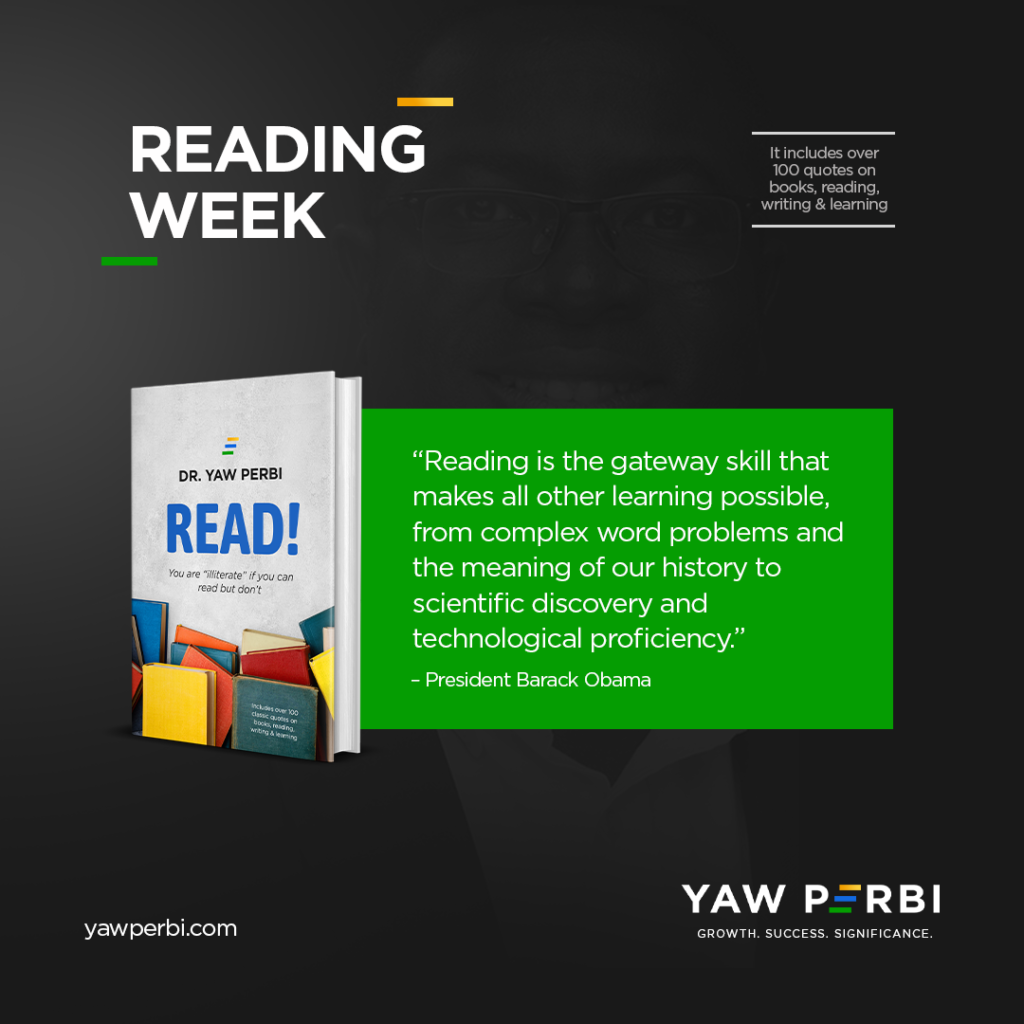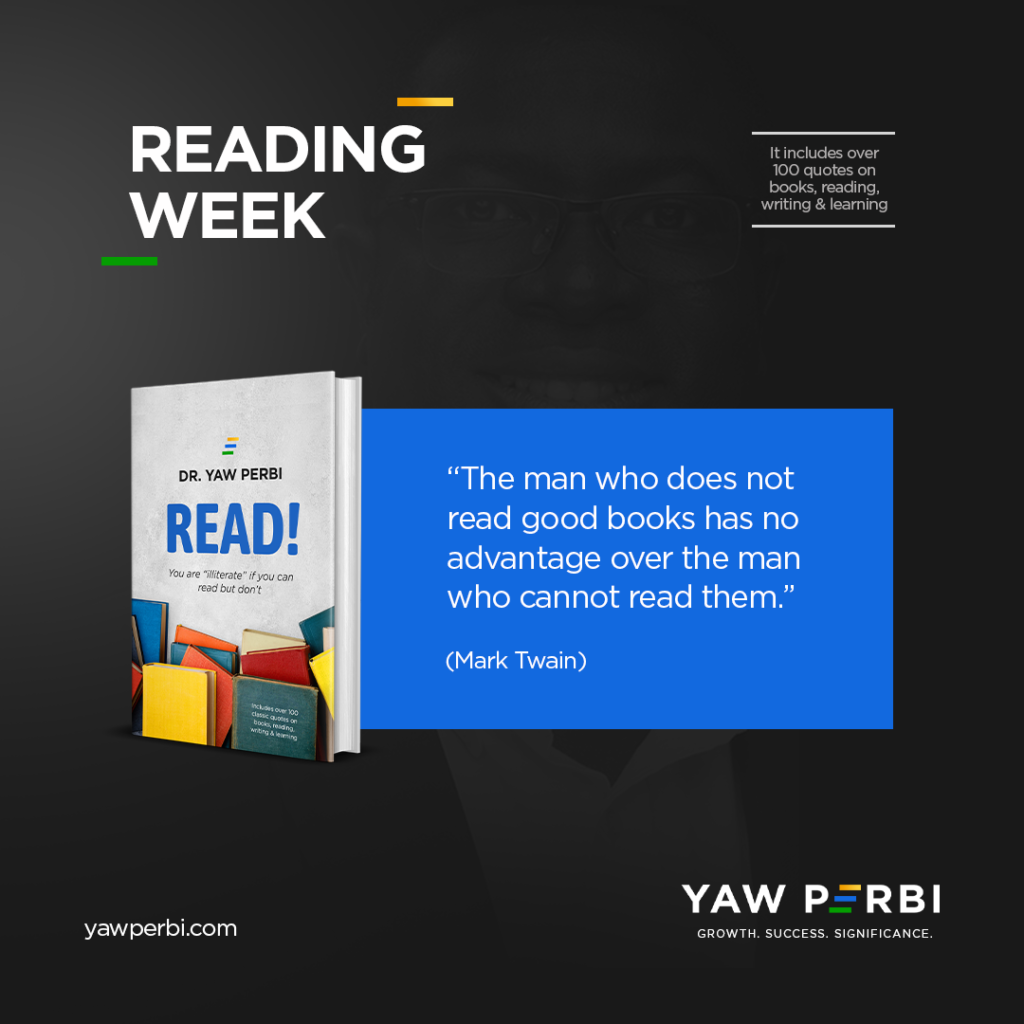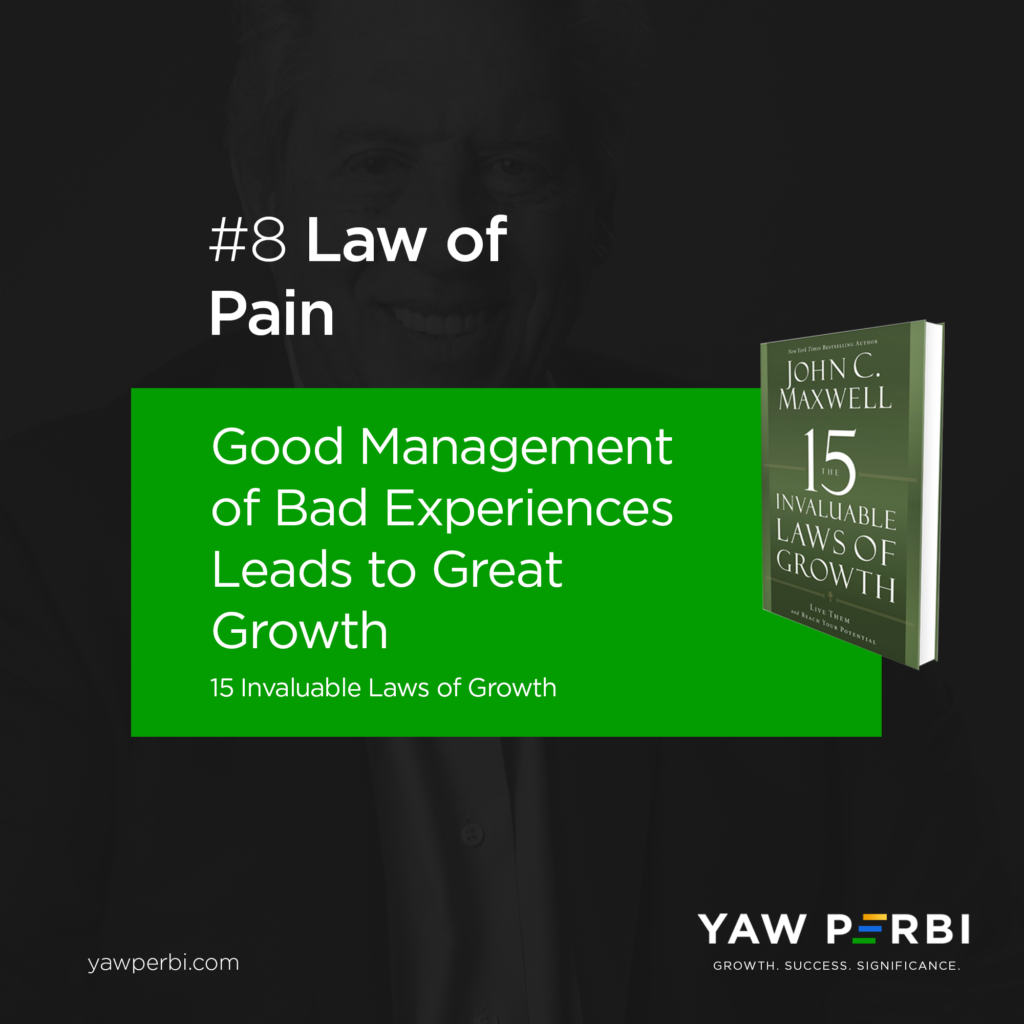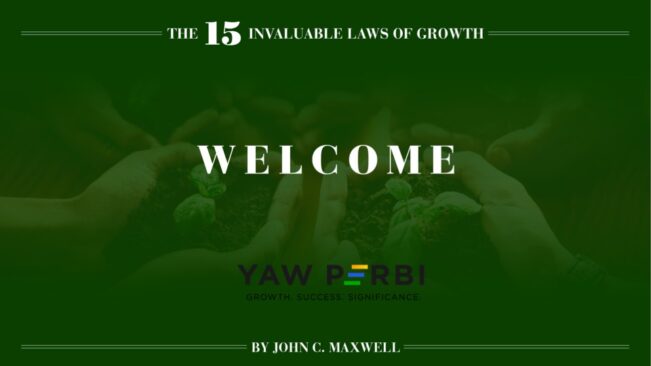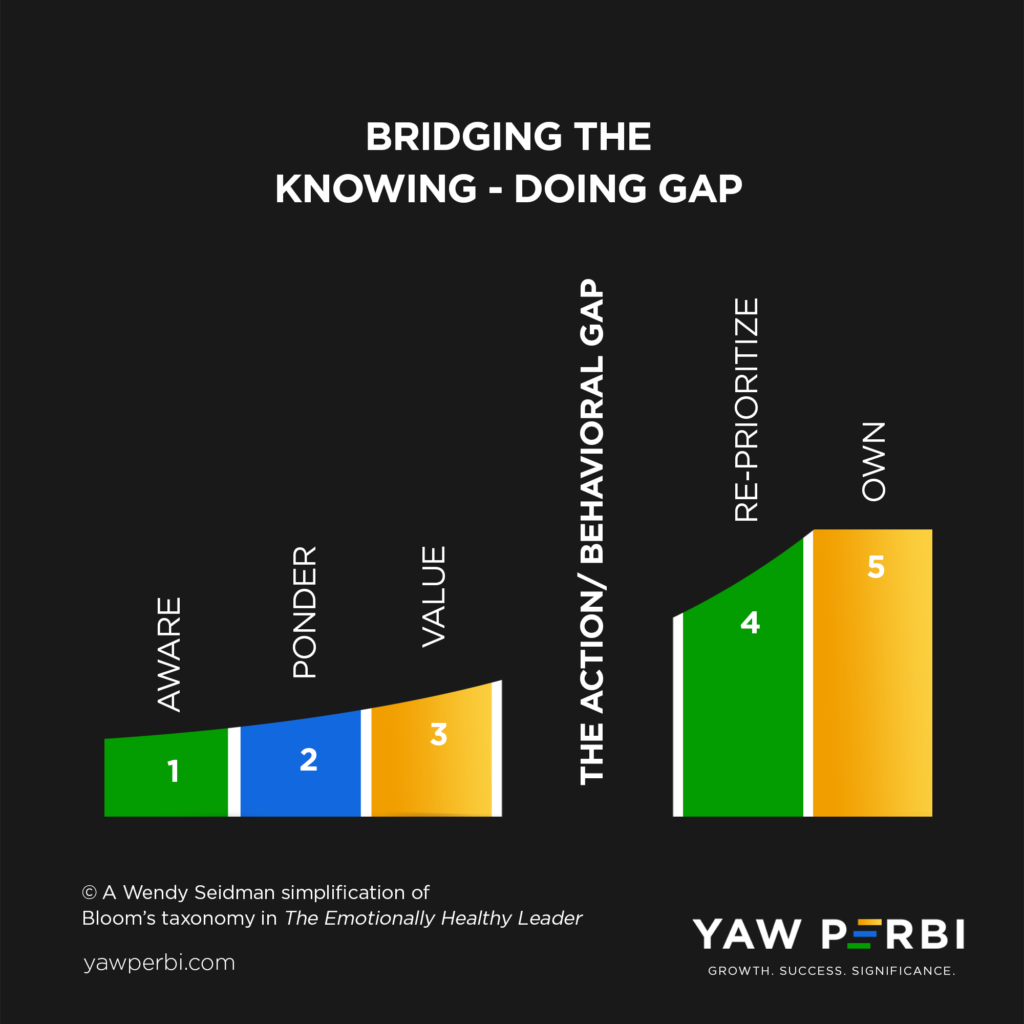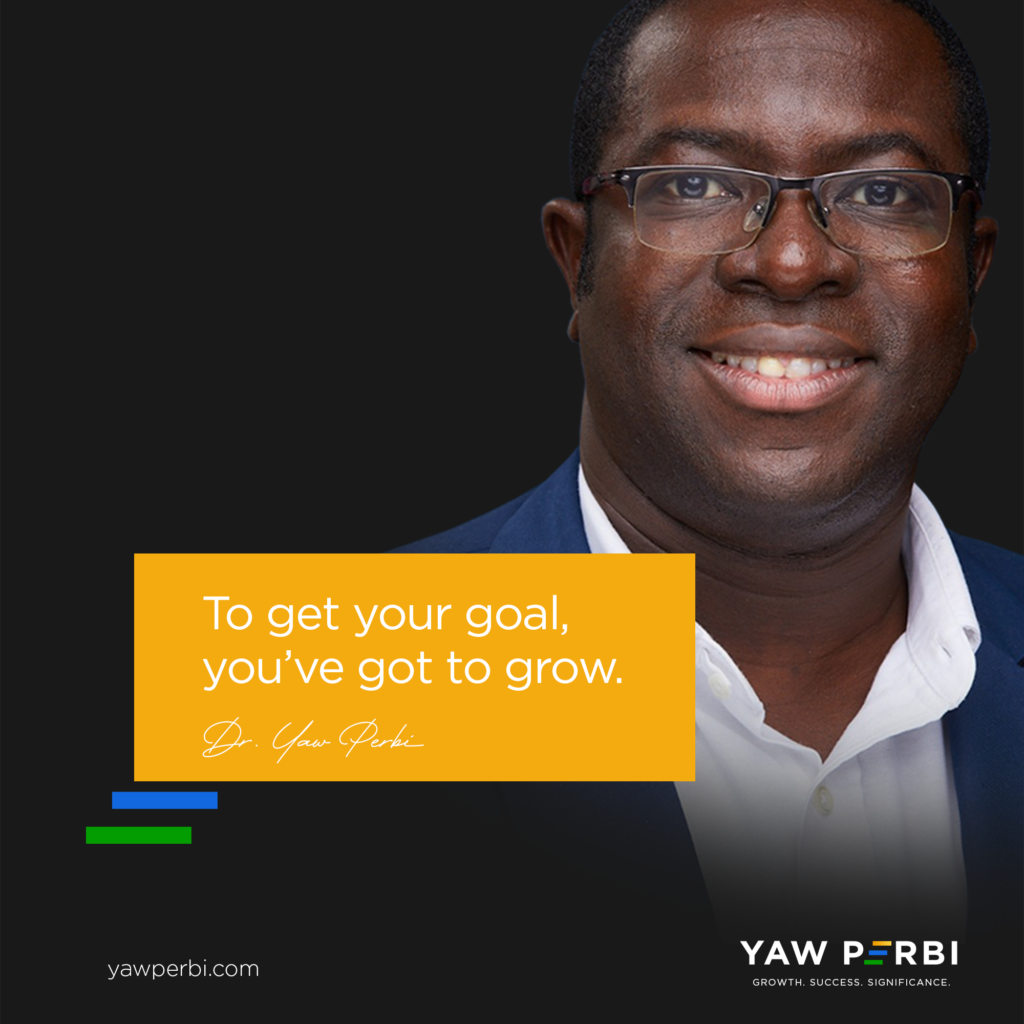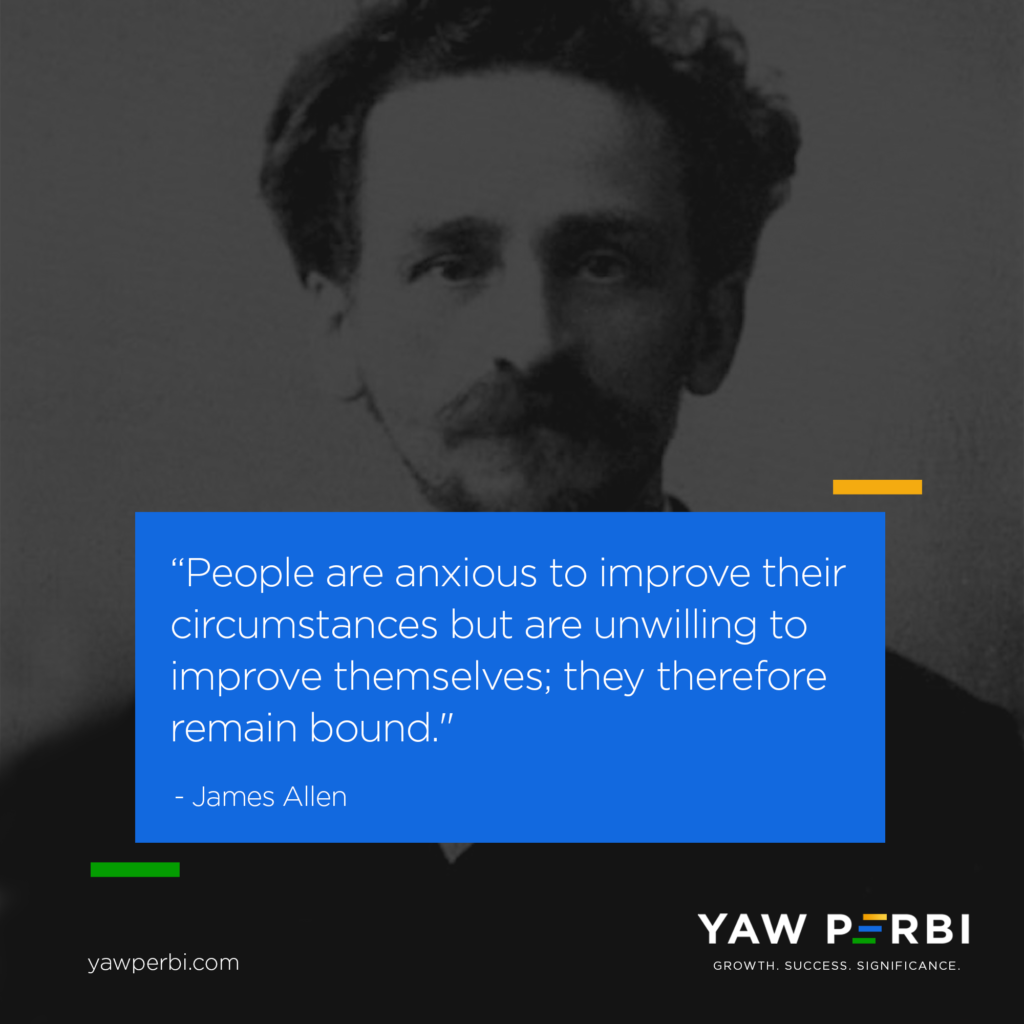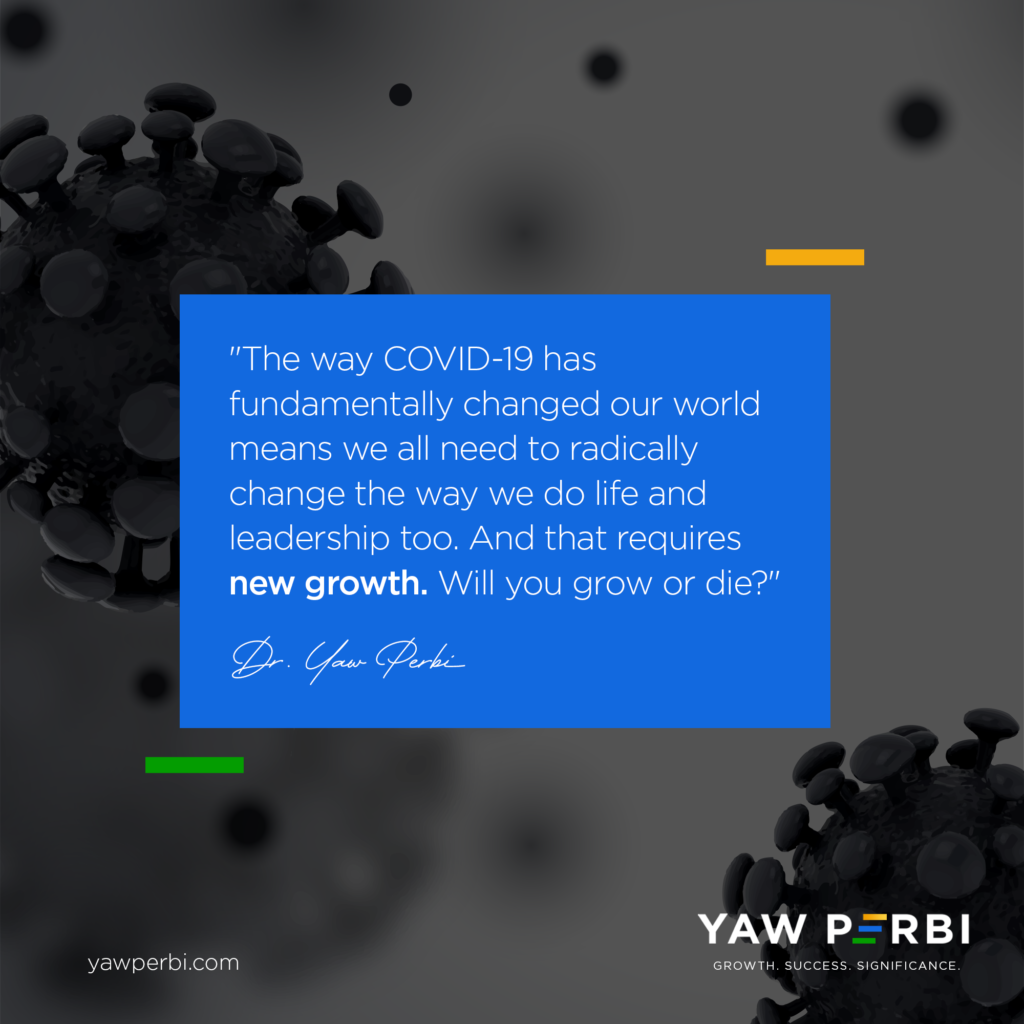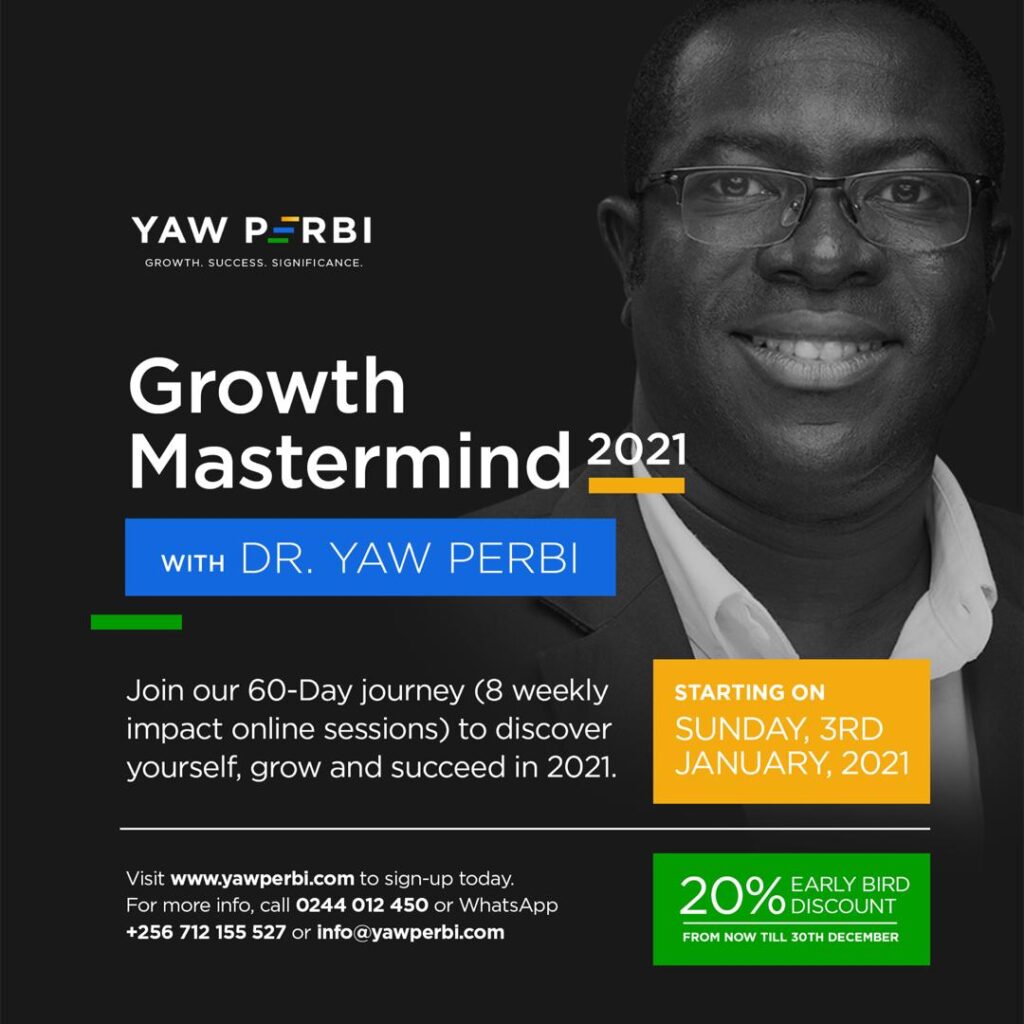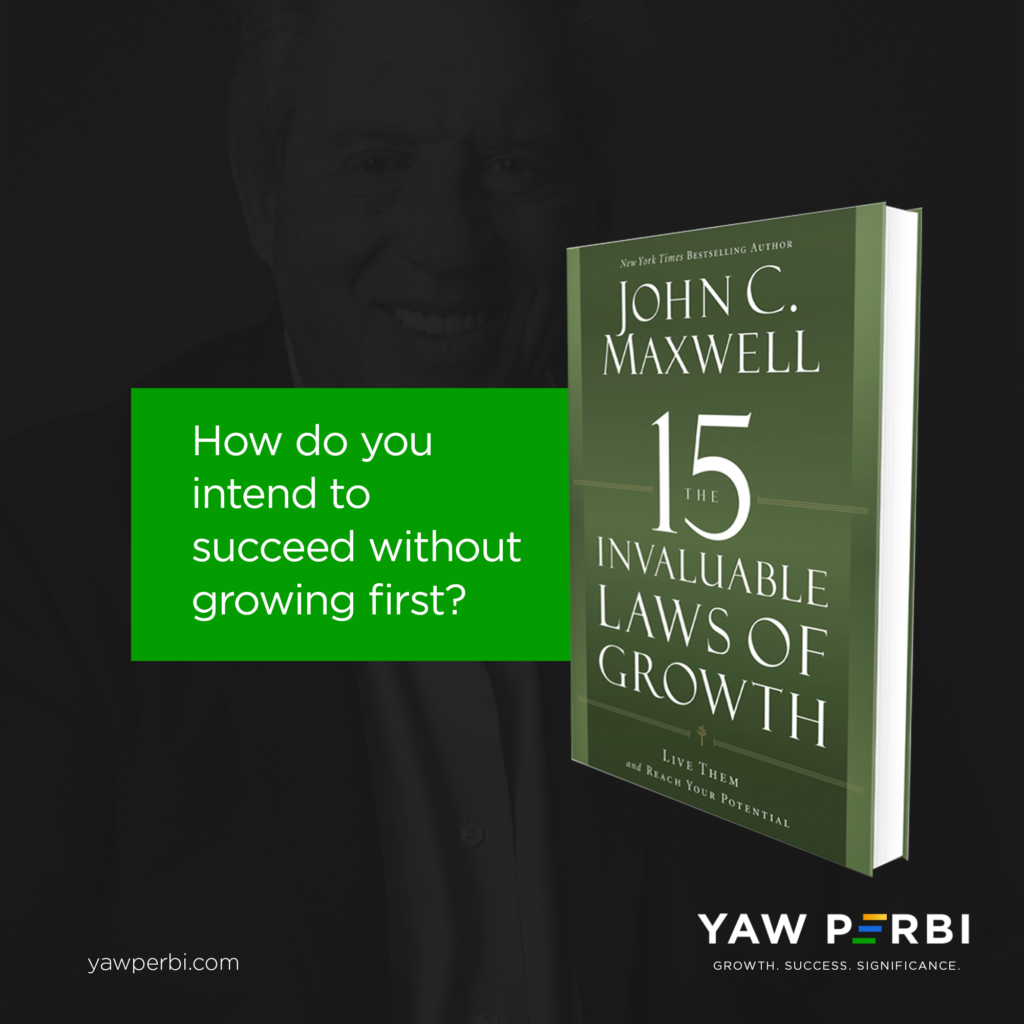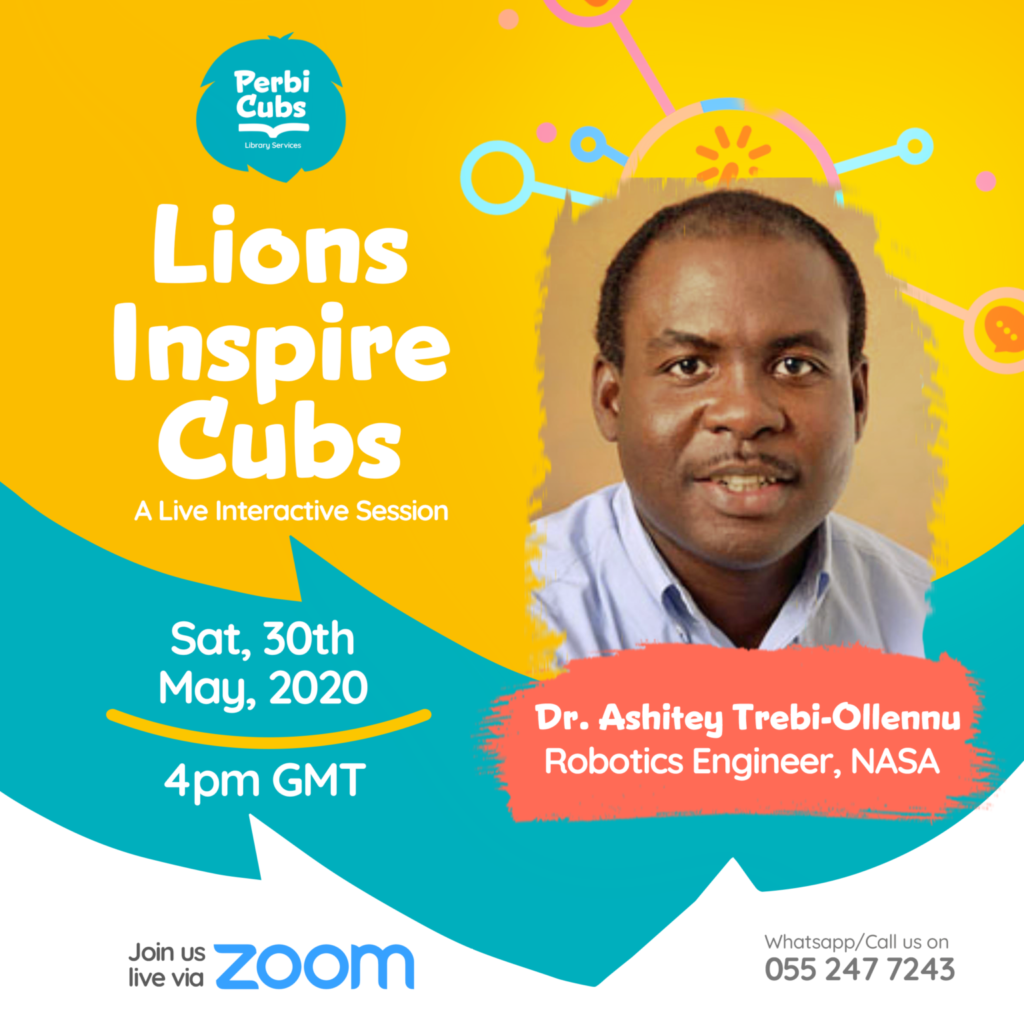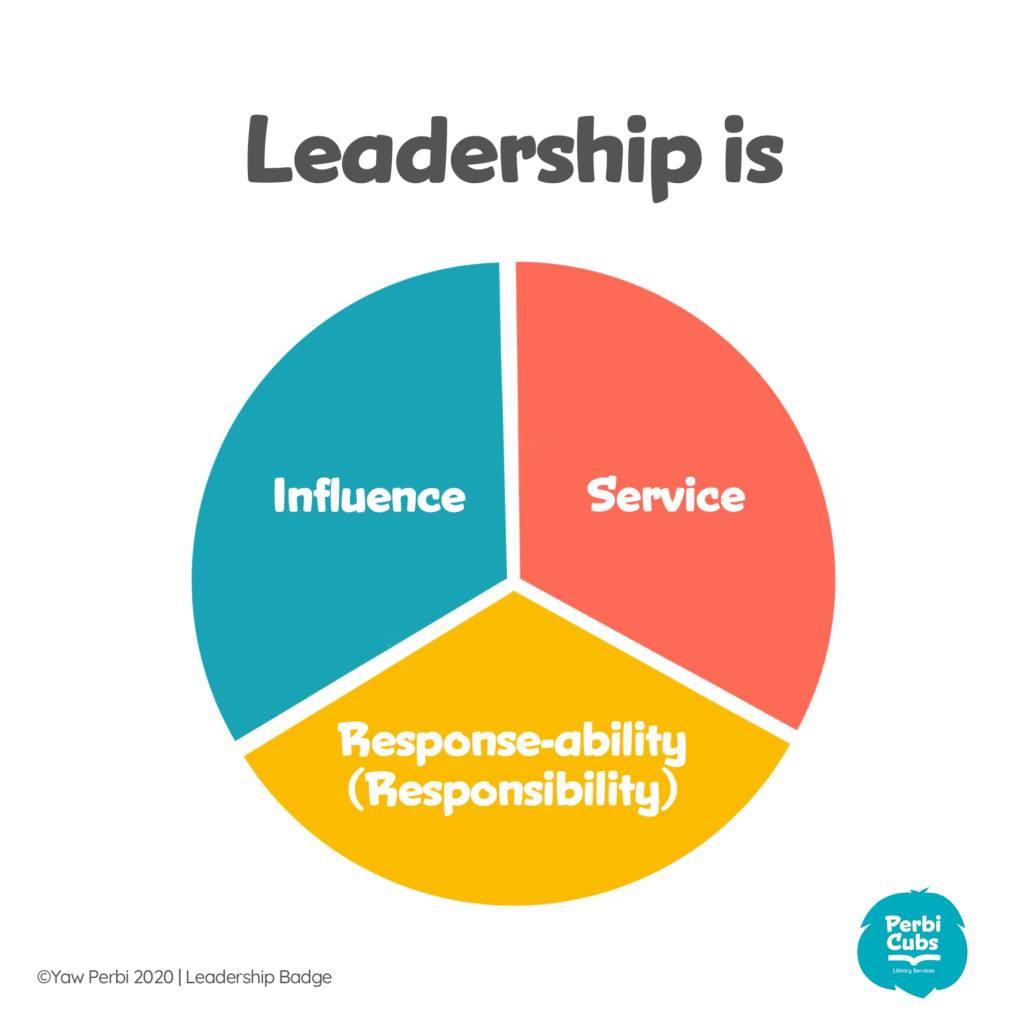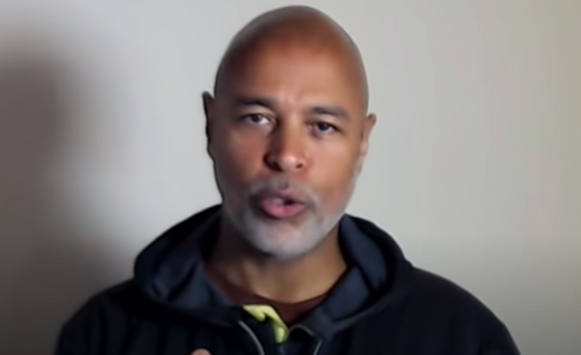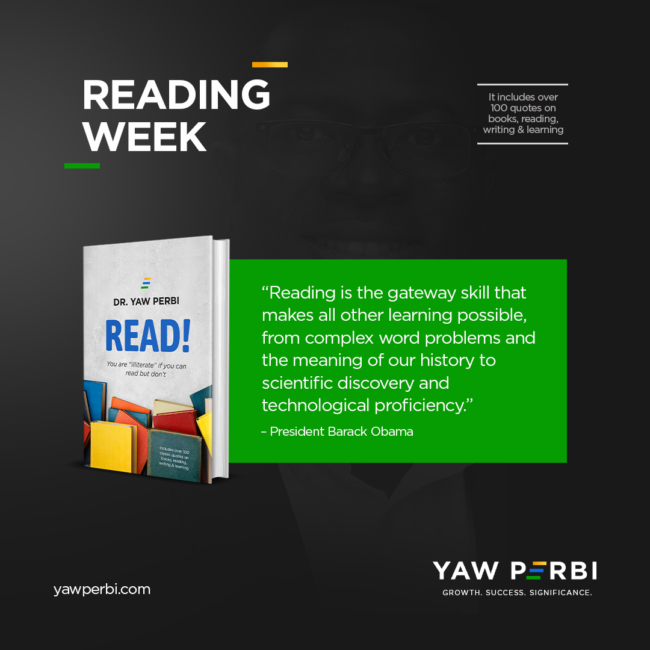
I Used Not To Like Reading. Two Statements Changed Everything.
I wouldn’t be where I am today but for books. I mean precious books like the Holy Bible (which I’ve read cover-to-cover about 10 times), Rich Dad Poor Dad (Robert Kiyosaki), The 7 Habits of Highly Effective People (Stephen Covey), The Purpose-Driven Life (Rick Warren), Before You Say I Do (Yaw Boamah), The 21 Irrefutable Laws of Leadership (John Maxwell), The E-Myth (Michael Gerber), The Prayer of Jabez (Bruce Wilkinson), Create Your Own Future (Brian Tracy), The Emotionally Healthy Leader (Peter Scazzero) etc. My life five years ago is totally different from my life now—and so was my life five years prior to that totally different—just because of the books I’ve read.
Consequently, for a decade-and-a-half now I’ve been a serious reading campaigner. Now, not only have I grown further fierce in campaigning for people to love reading, my wife and I have stepped up by stepping down. What I mean by that is, we’ve enhanced our campaign but decided to go further down to the age where humans are most pliable: childhood. And we began with our own seven children. This is the philosophy behind Perbi Cubs Library Services. You may find the story behind Perbi Cubs here.
But being a reading enthusiast, let alone champion, hasn’t always been so. I used not to like reading, at all! Then two statements hit me hard and totally shifted my paradigm, absolutely altering my way of thinking.
THE ‘RACIST’ & ‘TREMENDOUS’ STATEMENTS THAT CHANGED EVERYTHING
The first statement, I randomly encountered on the internet. I was but a youth then. As I confess in my book READ!, “I was so angry my intestines could have gushed out. If I were light skinned my face would’ve turned tomato-red instantaneously. Yet deep, very deep down my heart I knew there was a truth in this almost racist statement glaring at me from the computer screen.” This is what it said: “THE BEST WAY TO HIDE SOMETHING FROM BLACK PEOPLE IS TO PUT IT IN A BOOK!” Ah! Upsetting! Yet in many ways this is true, I’m ashamed to admit: We don’t read!
The other paradigm-knocking statement was Charlie ‘Tremendous’ Jones’ rather prophetic pronouncement: “You will be in five years where you are today except for the people you meet and the books you read.”
These two statements turned my life around to not only become a voracious reader and prolific writer, but an advocate of the same!
WHAT IS READING?
We all have read (or even still reading even right now) academic or technical texts to pass an exam or for promotion, for professional growth etc. That is not what I mean by my read campaign. When I speak of reading I mean leisure reading. Also known as “recreational reading, pleasure reading, free voluntary reading, and independent reading,” it is “independent, self-selected reading of a continuous text for a wide range of personal and social purposes. It can take place in and out of school, at any time” (International Reading Association).
Samuel Johnson shares the following sentiments: “A man ought to read just as inclination leads him; for what he reads as a task will do him little good.” I get him. Leisure reading must be voluntary and pleasurable–not just a chore–if it is to benefit us maximally.
WHY MANY ARE SCHOOLED BUT STILL “ILLITERATE”
Several of us who have learnt “ABCD…” and can practically function simply do not read. In my book READ!, first published in 2005, here’s my thesis: If you know how to read and you don’t, you are no different from the illiterate! The bottom line is the same: you both don’t read! That’s why the subtitle of the book is “You are an “illiterate” if you can read but don’t.” Many years ago Mark Twain put the same idea this way: “The man who does not read good books has no advantage over the man who cannot read them.”
CONCLUSION
If it’s any comfort to you, a guy who used not to like reading today reads several books at the same time! Even further, I’ve acquired this new habit of writing several books at the same time too! Something you need for your future to happen is hidden in a book near you. As they say at Perbi Cubs, “success is just a book away.” And it’s true. If you don’t believe Perbi Cubs or Charlie ‘T’ Jones, take it from me.
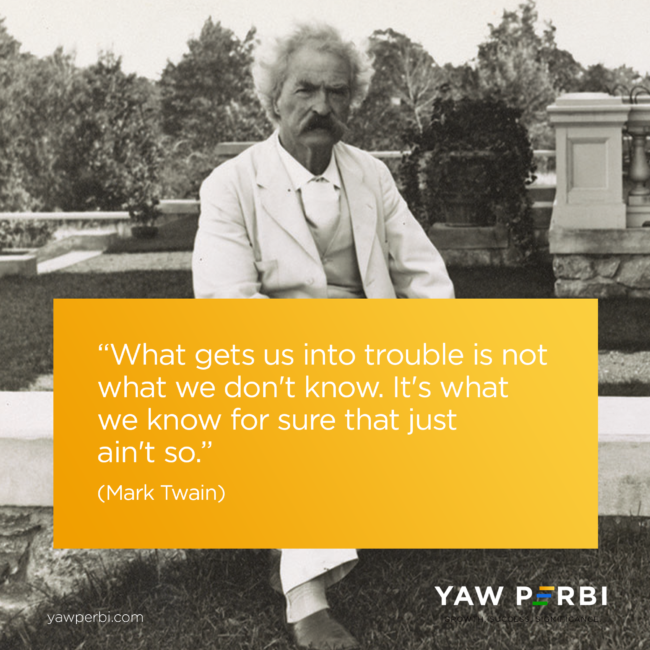
A Way to Prevent Heartbreak: Clarify Expectations
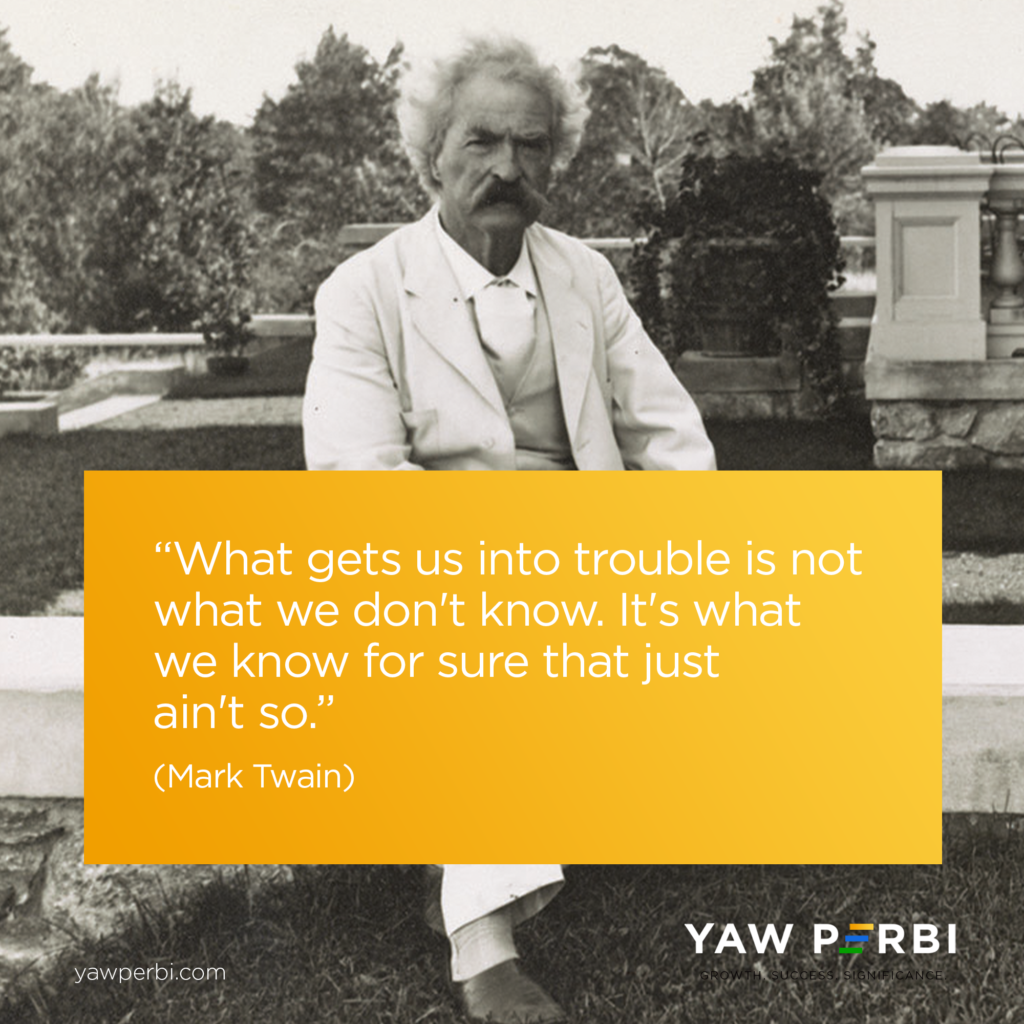
While what you don’t know may kill you; what you think you know but really don’t may kill you faster!
I have wanted to talk about this for months–how to prevent unnecessary hurt from unmet expectations–but last week an incident happened with one of my associates that really catalyzed me to share this urgently. So let’s talk about unmet expectations.
Whether it’s between spouses, parent and child, boss and workers or even among co-workers, family folk and church members, this is quite a common occurrence. This is particularly so African, Chinese, Japanese and Korean cultures that employ indirect communication. If you’re like me, you’ve probably been hurt before by unmet expectations. In fact, sometimes we don’t even realize we had an expectation until it was not met!
Mark Twain once said, “What gets us into trouble is not what we don’t know. It’s what we know for sure that just ain’t so.” We tend to have expectations that are unconscious, unrealistic, unspoken and unagreed upon. Let me share how you can flip these four things around and protect your heart against heartbreaks from unmet expectations. I owe this life-saving lesson from my New Yorkan mentors, Pete and Geri Scazzero.s
THE MILLION DOLLAR QUESTION
How do you know your expectations are valid or not? As hard-to-take as this may seem, when the expectation is unconscious it is invalid. In fact, if even we don’t even know we have them until we are disappointed how on earth is the other person supposed to know and meet it? When it is unrealistic it is invalid as well. Even if it is reasonable and we are conscious of it but it has not been articulated, it is still invalid. The common lame excuse we tend to give is, “Oh, but they should know?!”
In the event that our expectations meet all the above three criteria–conscious, realistic, spoken–but the other party has not agreed to them, they are still invalid. While this may seem very Western, I have learnt as an African-Canadian that it is never wise to assume agreement!
Of course, important caveats include marriage (where the vows already spoken have created certain clear expectations like fidelity), parent-child relationships (expectation of chores) and employer-employee dynamics where expectations have been clearly laid out in contracts and policy and supposedly read and accented to. Even in these relationships with broad-stroke expectations, situations occur that demand clarifying expectations further.
WHAT TO DO TO FORESTALL HEARTBREAKS
To prevent heartbreaks from unmet expectations, ensure your expectations are:
(1) Conscious: I am aware of my expectation.
(2) Realistic: I have evidence to support that the expectation is reasonable in the sense that the other is able and willing.
(3) Spoken: I have expressed the expectation clearly.
(4) Agreed Upon: The other person has agreed to the expectation by saying “yes.”
I would highly recommend you take the Scazzero’s Emotionally Healthy Relationships course for a full meal and good skill-building in this area they call Stop Mind Reading and Clarifying Expectations.
WHAT TO DO WHEN HURT HAPPENS
In the event that hurt still happens from unmet expectations, valid or not, REFRAMING the painful experience is everything. As John Maxwell renders it in the Law of Pain, “good management of bad experiences can lead to growth.” Reframe the painful experience as follows (modified from a Maxwell process):
a) Define the problem –> The painful situation I need to process right now is…
b) Understand your emotion –> My feelings about this are…
c) Articulate the lesson –> My lessons in is this are…
d) Identify a desired change –> The changes I want to effect are…
e) Brainstorm numerous pathways –> The ways out are…
f) Receive others’ input –> What I’m learning from others is…
g) Implement a course of action –> My course of action is 1. Embrace the reality of pain 2. Learn my lesson(s) 3. Share my lessons 4. Change a. ______ b. ______ c. ______ d. _____.
CONCLUSION
You know what they say happens when you assume: you make an ass of u and me. An expectation is only valid when it is mutually agreed upon. Let’s do less heart damage by providing and demanding clear expectations of others. Let’s ensure in all our relationships that our expectations are conscious, realistic, articulated and agreed upon. And when things fall through the cracks and we feel the sting of pain from unmet expectations, let’s reframe the experience well so we can still grow and flourish.

American Shitocracy and African Shitholes
‘Shit hole’ status is not the preserve of any people group, state or nation. Seasons change. Kingdoms rise and fall with terrific and terrible leadership respectively. Great civilizations have come and gone. If Africa continues on a trajectory of principle-centred, values-based, effectual leadership and America continues on her trajectory of shit-based leadership for long enough the tables will turn!

“I’ll be watching because history is going to be made,” were Trump’s inspirational words to ginger his soon-to-be-desecrating supporters who forced their way into the Capitol to interrupt the democratic transfer of power. Photo credit: Roberto Schmidt/Agence France-Presse — Getty Images
Bit by bit we’ve seen the shroud of so-called American exceptionalism come apart. Rent piece by piece, she’s revealing her warts to a watching world, stuck at home. What she’s done well for over 200 years to conceal—and not wash her dirty linen in public either—a combination of democratized social media, a TRUMPeting emperor with no clothes and a plaguing pandemic have conspired to expose. Lynchings like George Floyd’s are not new; it’s the handy smart phones and social media apps at the finger tips that capture and broadcast these which are.
Last Wednesday’s attempted coup d’état at the U.S. Capitol was the nadir of the last four years’ declivitous decline from apparent democracy to real shitocracy. I am not one to use the s-word; I’m only playing on the words of the supposed most powerful man on earth. Many aspects of the attack on the ‘people’s house’ by armed rioters a.k.a. domestic terrorists dropped my jaws (and kept my mouth agape) but the most shocking was literally the filthiest of all: desecration of the House with faecal matter, well-known in ‘shit hole countries’ as ‘shit bombing’. Just when you thought America could sink no further.
The shit-hole-country-conferring president of the Divided States of America inspired this group of shit bombers.

Thieves of democracy scaling walls like thieves do, as in the words of the New York Times, “largely unimpeded by police as they stormed the Capitol.” Photo credit: Jason Andrew for The New York Times
Let me tell America(ns) how we, Africans, got shit holed: LEADERSHIP! A long string of shit hole leadership like you’ve now gotten in the Black House (it’s only painted white and so-called but we know it was built by Blacks). If Africa continues on a trajectory of principle-centred, values-based, effectual leadership and America continues on her trajectory of shit-based leadership for long enough the tables will turn! You know how I know? Because “everything rises and falls on leadership,” E-V-E-R-Y-T-H-I-NG, shit and all. And that is a principle; a timeless, fundamental law of the universe that is no respecter of persons: red or yellow, black or white.
‘Shit hole’ status is not the preserve of any people group, state or nation. Seasons change. Kingdoms rise and fall with terrible and terrific leadership respectively. Great civilizations have come and gone. And I mean, greater civilizations than America, and that dominated for much longer than the toddling USA. America could be tomorrow what we call “ancient Egypt” today. Or even the beggarly Greece today, yes, Socrates, Aristotle and Plato’s Greece of yestercentury. In the last decade Portugal found itself borrowing money from her former colony Angola.
Meanwhile, my Ghanaian-Canadian children today wonder what is so ‘Great’ about Britain. Brexit? As for America, in the last few weeks we’ve spent more time at our Family Altar repeatedly praying for political peace in America and for the eradication of ignorance and disease (COVID-19) there than we have prayed about any of these for Africa!
Now to my fellow Africans. In the light of how backward America has proven to be recently, perhaps it is beginning to dawn on you that we may not be as backward as they (and some others) would like us to think! After all, when our ancestors were building pyramids their European forebears were but Barbarians (note: barbarian or barbaric is still not a fluttering word in the English dictionary today).
At the very time when there were prolonged pre, para and post electoral tensions in America, even with a sitting president refusing to concede but rather raising false alarms of a rigged election, Ghana figuratively and literally came from behind to vote, certify results within 72 hours and has already sworn-in a new president (an occasion the American president nominated American officials to attend). Now, look who’s shit hole!
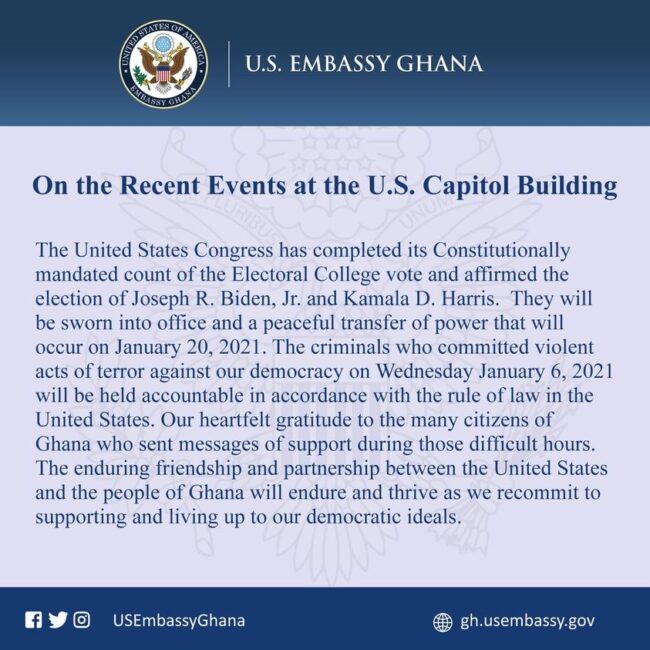
No one would’ve imagine such a notice from the U.S. Embassy in Ghana four years ago! “Our heartfelt gratitude to the many citizens of Ghana who sent messages of support during those difficult hours”? Wow!
Which is worse: being called shit hole or being shitty? It was America’s shitocracy that christened African countries as shit hole. But neither shitocracy nor shit hole is good enough for Africa or America. I have substantial interest in the prosperity of both peoples on both sides of the Atlantic–and so does the whole world stand to benefit. So upward and onward with godly, principle-centred, values-based, effectual leadership for the benefit of our peoples and to the glory of God. No more shit–shit holing, shit hollering or shit bombing. We were made for so much more than this.
Africa! America! African-Americans, arise, clean up and shine! Let our worst years be the last four; and our worst days among the last four too.
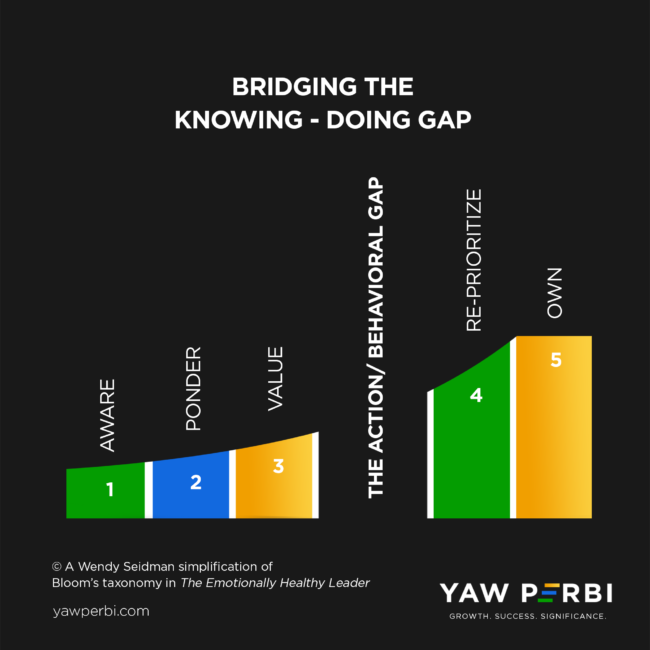
A Sure Way to Close the Widest Gap in the World
By now you should know for yourself that the widest gap in life or in the world is between knowing and doing. If we all put into practice every right thing we knew, our lives would be remarkably different, incredibly successful. Here’s why we don’t and what to do about it, especially in this season of ‘new year resolutions.’
What do a Microbiology PhD, Obstetrician, Civil & Environmental Engineer, Hotel HR Manager in Ghana, Marketing Executive at Ogilvy, Dentist in the United States, Consultant at Accenture, CEO of a Savings & Loans scheme in Uganda and a U.S. military personnel stationed in Italy have in common? And on top of all that, situated in three different continents on the surface not much; except these were all in the same room at the start of 2021 with one desire and purpose: to grow.
There’s no gainsaying that the dozen people constituting the first 15 Invaluable Laws of Growth mastermind group with YAW PERBI in 2021 know a lot. The combined expertise in the room is astounding; it is an honour just to be seated at the table with a leader with 18 years experience at Ghana’s Food & Drugs Authority and the rest of the crew.
We had all chosen to invest the time and money to be part of this mastermind because as Maxwell’s first Law of Growth makes plain, what he calls The Law of Intentionality, “Growth Doesn’t Just Happen.” In fact, “growth is [about] the only guarantee that tomorrow is going to get better”; that 2021 will be better than 2020. Although all these amazing professionals had a hint of this fundamental law of the universe, hence signing onto the mastermind group in the first place, by the end of the first 90-minute session this was so abundantly clear and weighing on us that my personal ‘statement of the day’ came from the FDA leader: “Growth is hard work.” Yes it is! And I’m so proud of these folks who are making an intentional, informed, sustained choice to grow themselves into success and significance!
SECRET TO CLOSING THE GAP
Perhaps no generation knows more, or at least has access to more knowledge in all sorts of media, than this current one. Yet by now you should know for yourself that the widest gap in life or in the world is between knowing and doing. If we all put into practice every right thing we knew, our lives would be remarkably different, incredibly successful. Richard Biggs says “the greatest gap in life is the one between knowing and doing,” a statement similar to John Maxwell’s, who puts it this way: “the greatest gap in the world is the gap between knowing and doing.”
While these already very knowledgeable folks will be even adding further to their professional knowledge vital new information about the Laws of Growth, what will catalyze and even guarantee their change and growth isn’t the HEAD stuff per se. Of course that’s where it begins but the problem is when it ends there, which is more often than note the case.
Considering the above Wendy Seidman simplification of Bloom’s famous taxonomy, the secret to the mastermind participants moving from abundant knowledge to abundant living by doing what they know they ought to do to grow will be as follows (this is the same for you if you intend to finally do something with all you already know you ought to do):
1. AWARE: This is a HEAD thing. Many of us begin from not even knowing what we don’t know, right? “Oh! So there are Laws?” ”Ei! And there are Growth Laws in particular?” right? How can people plan to do what they don’t even know in the first place?
2. PONDER: All of us are going to have ample time in between meetings to THINK about these laws but especially when we meet, as the facilitator I’ll be applying the major tool of a coach–questions, questions questions–to help clarify and deepen the pondering process. I say understanding is the product of pondering. Many times we don’t do because we don’t understand. But thus far, this is all still a HEAD thing.
3. VALUE: When folks actually begin to value that thing they’ve become aware of and have pondered, this is when things have travelled from the head down to the heart. It’s now a HEART thing. “Hmmmm… it must be important.” “Hmmm it may be a good thing oo…” A value is what you value, right?
I tell you, if “the greatest gap in the world is the gap between knowing and doing,” then the longest distance in the world might be between the head and the heart! Anatomically it’s only a few centimetres apart but metaphorically, that’s another matter. Yet it is necessary to value a thing, and feel it to move us to do anything. Do you see the word ‘motion’ in emotion?
Yet after our new awareness and pondering have dropped into the heart , there’s still a GAP—nothing changes in our action or behaviour, yet. It’s still not a HAND thing (action or behaviour) until usually with the help of accountable relationships (like coaches and mastermind compatriots) you gain the quantum energy to scale the action/behavioural gap to the land of re-prioritization. This is the longest and deepest gulf in the world, contributing the most to the gap between knowing and doing.
4. RE-PRIORITIZE: When you re-prioritize, you actually re-organize yourself, move others and things around you to make that new pondered and valued awareness actionable! Until you have re-prioritized, usually evident in the commitment of time, money (and other resources) and energy/effort, nothing changes.
5. OWN: I can give you an example of an area in which this entire process from awareness to ownership happened in my own life. It took me about six years to finally re-prioritize and start taking a proper weekly sabbath (not just a day off; to really stop all my work, rest, contemplate on God, delight in Him and his gifts). I can assure you that if I had a consistent, formal coach or mastermind group I was accountable to, it wouldn’t have taken me six years to make the quantum leap I needed to.
CONCLUSION
After seeing all these long distances and deep gulfs, can you understand why doing what we know is so hard. Come to think of it, who climbs the highest peaks in the world alone? You need a buddy if you’re to make it! That’s why this 15 Laws of Growth mastermind is a blessing! As co-travellers, we’ll all be AWARE of the same laws, PONDER these things (especially through the clarifying questions we’ll all be responding to), we will be expressing what we VALUE to each other’s hearing … and here’s the trick: we are there to encourage each other and hold each other accountable to make the leap to the other side of RE-PRIORITIZING and OWNING our growth and success.
Already, within the first 24 hours of the start of the mastermind, with everyone’s consent we formed a WhatsApp group through which we keep informing and reminding, pondering, valuing, and holding one another accountable to re-prioritize and own our growth journey to success over the next 60 days.
A sure way to close the widest gap in the world is accountable relationships to make the leap from merely valuing new knowing to re-prioritizing things in our lives towards new doing. So now you are aware why we generally don’t do what we know we should or even say we would–and what to do about it–especially in this season of ‘new year resolutions.’ Happy new year!
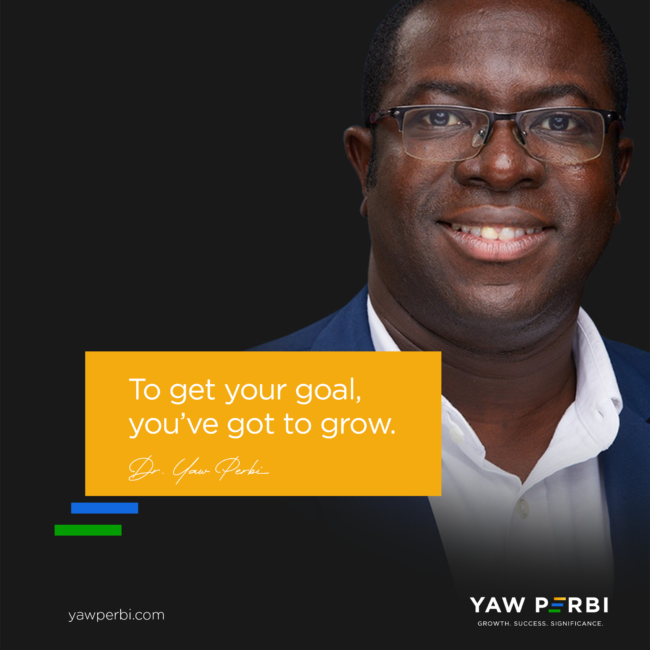
TO GOAL OR GROW? That is the question!
This is so counterintuitive that I don’t beat myself too much for almost completely missing it earlier in my life. I’m glad I have clinched that now: to grow an enterprise, grow people; to hit your goals focus on growing yourself and on the growth process.
GROW ME
Like most people I know, I love the word potential. Potential is the difference between who/where you are now and who/where you could be. Success, then, would be getting to who/where you could be. Being a go(al)-getter, one of the biggest mistakes I’ve made in life has been to keep the target or goal so much in mind and trying to figure out various strategies and timelines to hit it but neglecting the most important thing and most important one: growth and me. John Maxwell puts it succinctly: “To reach your potential you must grow. And to grow, you must be highly intentional about it.”
No matter the systems and structures, tools and technologies, courses and cash one gathers to hit a goal, unless there is investment in the growth of the person(s) involved, the goal is unlikely to happen. To achieve a goal, invest in growth of those the fulfillment of the goal depends on. To grow an enterprise, grow people.
Try something else in the new year: keep the goal in mind but focus on you (or whoever it depends on) and focus on a growth process. Let’s see what happens. I take my mentor John’s counsel seriously: “If you focus on goals, you may hit the goals, but that doesn’t guarantee growth. If you focus on growth, you will grow and always hit growth.” This is how to win, 100% of the time!
Here’s a paragraph from John’s 15 Invaluable Laws of Growth, which at the start of the new year I take a selected few through, that makes the point:
“If you want to discover your purpose, you need to grow in self-awareness. To become a better human being, you need to grow in character. To advance in your career, you need to grow in your skills. To be a better spouse or parent, you need to grow in relationships. To reach your financial goals, you need to grow in your knowledge about how money works. To enrich your soul, you need to grow spiritually.”
In similar fashion, as James Allen wrote in his classic As a Man Thinketh, “People are anxious to improve their circumstances but are unwilling to improve themselves; they therefore remain bound.” Get it? To get your goal you’ve got to grow.
GO WITH ME
Now, assuming you’ve agreed with me that you’ve got to grow to succeed, then the next logical question (in all probability) is how do I grow?. Well, you need to know the principles (laws) governing growth and have a plan and process to grow. Key to this plan and process is, again, people.
They say “we become the combined average of the five people we hang around the most.” Take a quick inventory right now. Depending on who your average five turn out to be, you must be pretty excited or pretty disappointed right now.
Apart from becoming a growing person yourself (towards your goals), you also need growth people, to stimulate, guide and guard your growth. This may be in the form of an accountability friend, a supportive spouse, an executive coach, or a small group like a mastermind.
I like to say that where two or three come together ‘magic’ happens. It is true. No matter how brilliant the ideas I think I have are, somehow when I meet with a group of people to discuss it the final outcome is much much better than my best ideas. It goes without saying that all of us are better than any one of us, any day! That is what Napoleon Hill discovered (mentioned in his 1925 book) and called a” mastermind”–when two people come together they create a third, invisible mind which is greater than the sum of the other two.
So for ideation, encouragement and accountability, everyone needs someone to come alongside them in their growth journey towards goal-getting.
CONCLUSION
To goal or to grow? That is the question. This is so counterintuitive that I don’t beat myself too much for almost completely missing it earlier in my life. I’m glad I have clinched that now: to hit your goals focus on growing yourself and on the growth process. Even if you don’t hit your goal, you will hit your growth.
Be goal-bound (as in, headed towards your goal) not situation-bound (as in, stuck where you are) by being growth-bound (heading towards growth and sticking to growth). Set your goal alright but then focus on the growth it will take. To hit goals, focus on the person(s) involved and on the growth process. To get your goal you’ve got to grow. This is how to win 100% of the time!
Post Script
If you want to see if there’s still room for you in the 2020 Growth Mastermind click here.
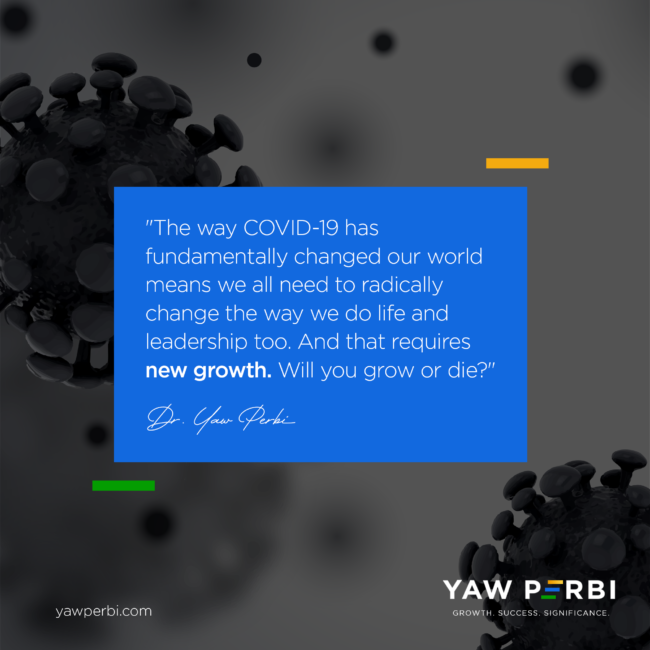
Festival of Nine Lessons & Corona
“The novel coronavirus is not just something for leaders to ”get through” for a few days or weeks. Instead, we need to treat Covid-19 as an economic and cultural blizzard, winter, and beginning of a “little ice age”—a once-in-a-lifetime change that is likely to affect our lives and organizations for years,” says Andy Crouch et al. I concur.
Just before Christmas 2020 my lawyer-banker friend and fellow John Maxwell Certified Trainer/Coach, Samuel Anim Esq., asked that I join him do an autopsy of the pandemic year 2020 live on Facebook/Youtube to draw leadership lessons. I was honoured and humbled. Honoured because it is a privilege to offer thought leadership and there is a myriad of leadership experts to choose from. I was humbled because not only do I not know all the lessons from Covid-19, I am still evaluating and learning from what I would perhaps call “the strangest year of my life.”
Nevertheless I managed to throw a few of my reflections together and gave it a funny title. Since around that time of the year there is the traditional Festival of Nine Lessons & Carols I thought of making this a Festival of Nine Lessons & Corona. Certainly there are more than nine leadership lessons from this Coronavirus pandemic year but here are some:
1. EMBRACE PARADOX
Perhaps no one and nothing captures the paradox of 2020 like Charles Dickens and his classic phrase, “It was the best of times, it was the worst of times” (from A Tale of Two Cities). This same 2020 year, over 1.67 million have died and 42.6 million have recovered. You may have lost someone to COVID-19 but you are alive. I’ve been stuck at home but I’ve had the longest unbroken quality bonding time with my family ever! We lost our family’s physical library services business but gained online business five times the physical capacity. Whole old industries, like aviation, have been decimated but whole new industries have emerged and are booming like Zoom. 2020 has been catastrophic yet catalytic.
Welcome to leadership. Embrace paradox. Think of the paradox of a servant leader, as a prime example of leadership paradox. True leadership is almost always straddling two seemingly opposing worlds, something Bob Fryling describes as “the leadership ellipse” because an ellipse “is defined by two distinctly different focal points that are of equal importance. One point is not inferior to the other, and both are needed if there is to be an ellipse.” I previously blogged about this in more detail here.
“It was the best of times, it was the worst of times, it was the age of wisdom, it was the age of foolishness, it was the epoch of belief, it was the epoch of incredulity, it was the season of light, it was the season of darkness, it was the spring of hope, it was the winter of despair.” ― Charles Dickens, ‘A Tale of Two Cities’
If leadership has always been about managing the tension of tasks or people, money or mission, the present or the future, inner spiritual longings and the outward needs of the group we lead, being and doing, community and cause, truth-telling and putting the right spin on things, to live in the world without being of the world, to be faithful or fruitful etc. then all of these have been put on steroids in a para and post-Covid world.
I have said before and I repeat: “the degree to which one is able to be comfortable with and live, love and lead well in the tension of this and that, yin and yang, determines their ultimate leadership success or otherwise. From my little experience and research, the best leaders in the world are those who are not only able to get comfortable with being uncomfortable living in such tensions but mastered the art of dextrously handling both well.” The post-Covid world leaves us no choice. Embrace paradox or die.
2. MAINTAIN THE MISSION, MUTATE THE MEANS
You and yours don’t want to end up like the Choluteca Bridge in Honduras. It was initially built in 1930 and reconstructed in 1996 to withstand tough weather conditions, including hurricanes. Well, two years later, in 1998, the bridge did prove its mettle, withstanding the category five storm, Hurricane Mitch, that devastated Honduras. Buildings were destroyed and roads wiped out but the bridge survived in near perfect condition. The only problem was that there were no roads for it to connect to anymore (roads wiped out at both ends) and the strong winds of the hurricane had caused the river to carve out an entirely new path that no longer ran under the bridge!
Think about it: a bridge connecting to nowhere and no one; and over nothing! If a bridge is no longer a way or a means to a desired end, then what is it? Similarly, if your pre-Covid means are no longer effective post-Covid as ways to deliver your mission, then of what use are they?
You certainly don’t want to lose sight of your vision or your grip on your mission but when it comes to your strategies, your ways and means to accomplish your mission, you don’t ever want to be dogmatic about that. In matters of mission, be as solid as a rock; but regarding the means flow like a river.
THE OTHER SEVEN LESSONS
3. Global community is the real deal context of leadership
4. Capitalize on era of Business without Borders
5. Heed the Harm to our House (Earth)
6. Inequities, Inequalities, Integrity-lessness will be exposed with time
7. Reflective lifestyle is the must-have rhythm of leadership
8. Become and raise agile “VUCA Prime” Leaders (VUCA is an acronym for Volatile Uncertain Complex Ambiguous)
9. HOPE is the real vaccine.
For further details of each lesson, watch the full video here.
CONCLUSION
If there is any one of these nine Covid-19 life and leadership lessons you need to grow in for a more successful 2021 you’re in good company. Join me. Come to the growth table. Join the 15 Invaluable Laws of Growth January journey in the form of a mastermind group of just 15 high level executives. Register right now here. The way COVID-19 has fundamentally changed our world means we all need to radically change the way we do life and leadership too. And that requires new growth. Will you grow or die?
Post Script
Earlier in the last quarter of the year I shared my faith-based Covid-19 reflections vis-a-vis Christian mission with pastors and church leaders here.
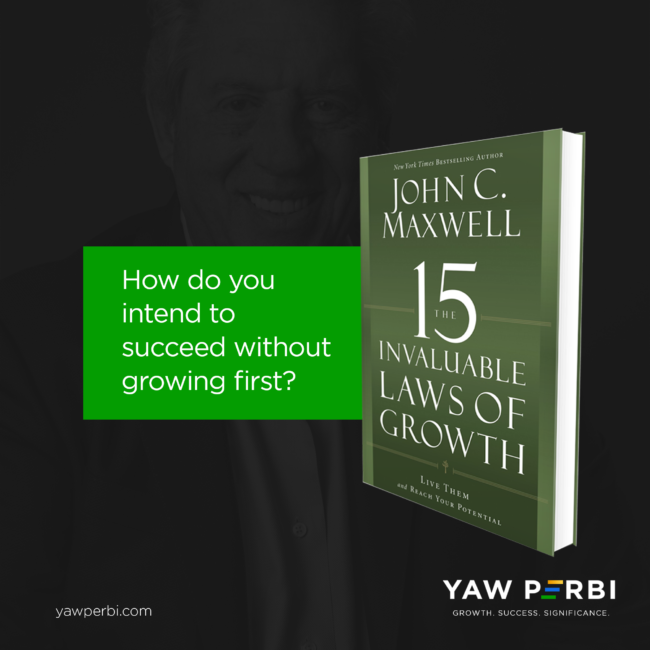
THE THING ABOUT LAWS | The ’15 Invaluable Laws of Growth’ Mastermind
Yes it’s a free world and humans are at liberty to do pretty much whatever we like. Or… well… maybe that’s not entirely accurate. There are laws or principles that have been here before us which we defy to our own hurt, irrespective of how noble our intentions might be. For example, some people intend to succeed in life without first growing. Forget it. It’s a law.
OF BATTLESHIPS AND LIGHTHOUSES
My all-time favourite story to illustrate the fact that there are fixed laws that govern life in our universe and that they don’t (and won’t) change to suit us but rather we ought to alter our lives to conform to them is this one told by Frank Koch, an experienced man of the seas, in Proceedings:
Two battleships assigned to the training squadron had been at sea on maneuvers in heavy weather for several days. I was serving on the lead battleship and was on watch on the bridge as night fell.
The visibility was poor with patchy fog, so the captain remained on the bridge keeping an eye on all activities.
Shortly after dark, the lookout on the wing of the bridge reported, “Light, bearing on the starboard bow.”
“Is it steady or moving astern,” the captain called out.
Lookout replied, “Steady, captain,” which meant we were on a dangerous collision course with that ship.
The captain then called to the signalman, “Signal that ship. We are on a collision course, advise you change core 20 degrees.
Back came the signal, “Advisable for you to change course 20 degrees.”
The captain said, “Send, I’m a captain, change course 20 degrees.”
“I’m a seaman second class,” came the reply. “You had better change course 20 degrees.”
By that time, the captain was furious. He spat out, “Send, I’m a battleship. Change course 20 degrees.”
Back came the flashing light, “I’m a lighthouse.” We changed course.
Just like the lighthouse, the laws/principles that run the universe are fixed and provide us a framework to live successful lives and irrespective of our perceptions, status in life, ambitions or raw muscle effort (like the battleship captain) they won’t, indeed they cannot, change course in our favour, we have to.
WHAT THESE LAWS ARE/AREN’T
Principles are fundamental, universal laws and timeless truths that govern everything in this universe. The thing is that the physical principles like the Law of Gravity are more easily appreciated than the ones our five senses can’t readily observe the consequences of. The laws of success, relationships, finances, spirituality etc. tend to be more difficult for us to wrap our heads and heart around. Even the Law of Sowing and Reaping (or Law of Cause and Effect), that whatever a person sows, that also will they reap, is very much appreciated when it comes to agriculture, yet somehow we miss it when it comes to the good/evil we do to others or even how this law plays out in our financial lives.
Yet these laws of life are “practical realities.” And the other thing is they’re not partial i.e. they are no respecter of age, gender, geography, religion etc. and they are not not values. Our values are what we value; what we consider good, and they had better be aligned to these universal laws we speak of, otherwise we would bear the negative consequences all the same. Stephen Covey puts it best:
All the wishing and even all the work in the world if it’s not used on valid principles, will not produce quality-of-life results. It’s not enough to set goals or climb ladders. It’s not enough to value. The effort has to be based on practical realities the produce result.
TO SUCCEED OR NOT TO SUCCEED
Success doesn’t just happen; it takes growth. Growth doesn’t just happen either; it takes intentionality (Law of Intentionality). I see a lot of hope for and talk about success, yet not so much about growth first, which then leads to success. That is a law of success, my friend, that one needs to grow into success. About a decade ago, I wanted to succeed in real estate investment yet I did not own a single property. In order to succeed I disinvested all the shares I owned on the Ghana Stock Exchange in order to invest in my growth in this area when Robert Kiyosaki’s team reached out with courses and one-on-one mentorship. If today, I ‘ve owned (and still do) several properties in three different countries, that small success did not come by chance. Not only did I have to grow, I had to sacrificially invest in my growth (the Law of Trade-Offs).
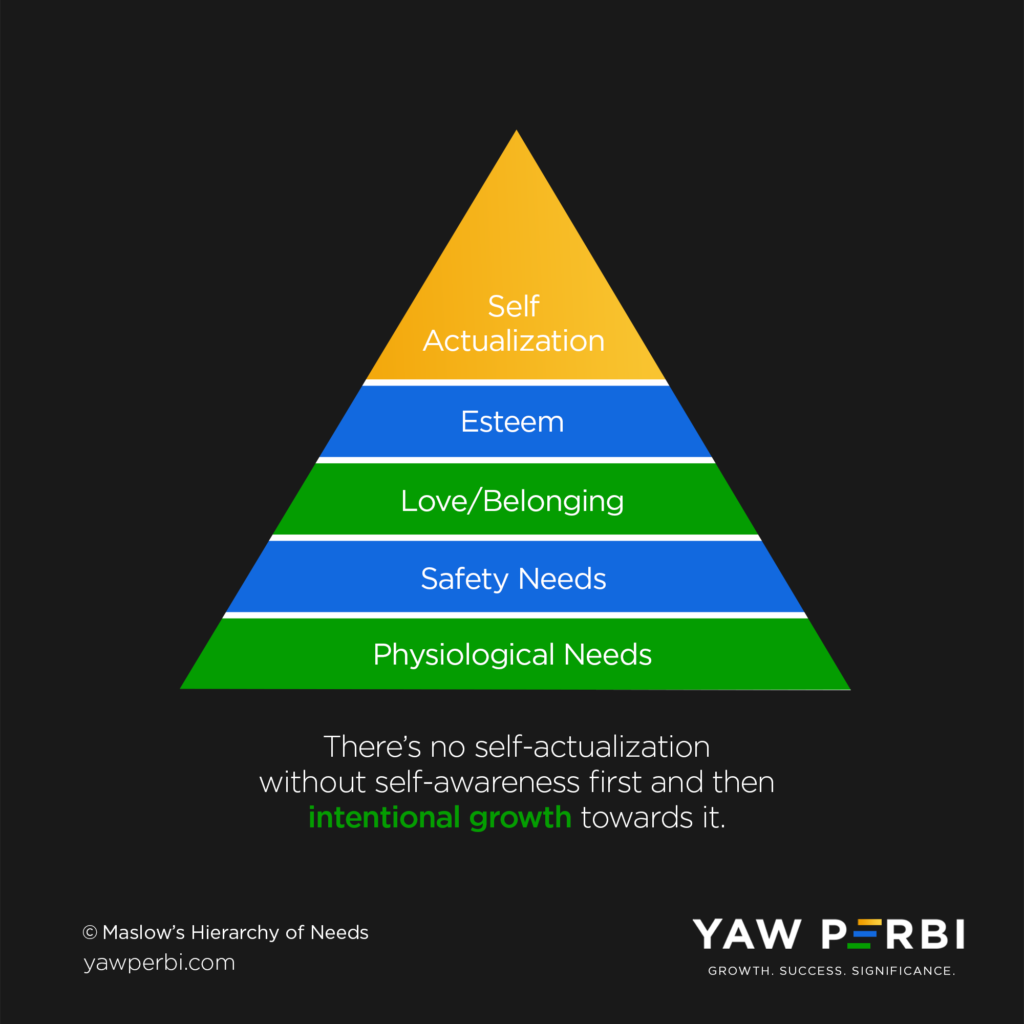
There’s often talk of the apex of Maslow’s pyramid (self-actualization) without the starting point (self-awareness)
Knowing who/where you are now (Law of Awareness) is as important as knowing who/where you want to be (Law of Vision). I hear a lot of talk about self-actualization and not nearly as much about self-awareness; yet we might as well forget about self-actualization without self-awareness first.
CONCLUSION
So when I hear people say “my principles,” I get what they mean, but really the only thing we own is our values and choices. We get to make choices but the consequences of those choices are already predetermined by the timeless, fundamental laws of the universe. The principles that govern life and success are not ours; they are ‘YUGE’ and not subject to our whims and caprices.
It is always a gift when after years of research people are able to capture in a single sentence or mathematical formula one of the laws of the universe–whether it’s Newton (motion), Einstein (relativity) or Maxwell (growth). And even more special when a series of these laws are captured in a single book, like the Bible.
Post Script
The 2021 cohort for the 15 Invaluable Laws of Growth mastermind is almost full. Are there only 15 Invaluable Laws of Success? Probably not. There might be a few more. But the thing is that there’s no going past these 15 to succeed. There will be ‘mirrors’ at our growth table in January (to get self-aware). Then we can measure the gap between who/where we are now and who/where we want to be and chart an intentional plan to close the gap and succeed.
Come to the table. Join the 15 Invaluable Laws of Growth January journey. Register now right here.

How to Eat an Elephant
“The world has entered an era of the most profound and challenging change in human history. Most of our children are not prepared, and we know it. Parents around the world see the change and know that the traditional three R’s–reading, writing, and arithmetic–are necessary; but not enough. Their children need to become far more responsible, creative, and tolerant of differences. They need to increase their ability to think for themselves, take initiative, get along with others, and solve problems. Business leaders are not finding people whose skills and character match the demands of today’s global economy, including strong communication, teamwork, analytical, technology, and organizational skills. They need young people who are self-motivated, creative, and have a strong work ethic. How will we bridge this ever-widening gap?” (Leader in Me blurb)
In my previous blog, I highlighted the current global leadership crisis epitomized by the likes of U.S. president Donald Trump. Yet even over a decade ago, leadership gurus like Stephen R. Covey (of The 7 Habits of Highly Effective People fame) uttered the above words, speaking of an era of challenge our children are unprepared for. The present leadership crisis has been brewing for a long time. If we do nothing about it, we’ll be setting our world back generations, and for generations to come. So how in the world are we going about it, growing leaders from childhood? I’m glad you asked.
THE ROLE OF LIT
Perbi Cubs Library Service through their book collection, activities and Lions Inspire Cubs programs inspire and empower children to be ready for leadership and impact. The Lions Inspire Cubs program has featured Lions (Leaders making impact in society) like Dr. Ahitey Trebi-Ollenu, a Robotics engineer at NASA.
The final element of this attempt at raising young, holistic leaders is the newly-launched Lions in Training (LIT) track which results in medallion awards for Cubs. As a firm, YAW PERBI is working with Perbi Cubs from the grassroots with children at home and in school. We consult for Perbi Cubs, providing the theoretical basis and praxiological framework, breaking down high level leadership concepts into small bits to deliver leadership development to 7-14 year-olds. After all as huge as it is, even an elephant can be eat. But how do you eat an elephant? Bit by bit.
ROLE OF PARENTS IN LIT
I have often said that, “Charity begins at home, so does leadership.” Parents are not only the primary caregivers of children but their primary leadership coaches as well. Of a truth, “the hand that rocks the cradle rules the world.” So together with parents, every quarter we focus on three core areas that when gotten right will have a significant change/impact in the lives and leadership of these Cubs. Every Thursday, parents receive an email to evaluate how the child did that week as leader. These three core areas of evaluation focus on various everyday practical actions and inactions of the Cubs at home and in school.
LEADERSHIP BADGE
So after digesting tonnes of leadership articles and books and studying global leadership even at the graduate level, I have come to the conclusion that although there are over 360 documented definitions of leadership, leadership is basically responsibility, service and influence. The easiest way for a child to understand a ‘big word’ like responsiblity is response-ability.
This diagram (above) may seem simple but it is one of those things referred to as simplicity at the far end of complexity. It looks deceptively simple but has come through after a lot of complex thinking processes.
ON YOUR MARKS…
So for this quarter, this is how the children are being observed, encouraged and evaluated as Leaders in Training (LIT) in practical terms:
A. Responsibility is response-ability:
- Cub chooses to do the right thing without prompting.
- Cub is able to take charge of getting their school work done.
- Cub does not blame others for their circumstances.
B. Service is being of use to others:
- Cub is helpful at home and school.
- Cub willingly does their chores.
- Cub does not boss other people around.
- Cub uses their talents/gifts to help others or make their lives better.
C. Influence is producing effects on others:
- Cub exerts positive peer pressure.
- Cub affects the actions, behavior or opinions of siblings and friends in a good way.
- Cub sounds convincing in expressing their opinion.
CUBS CAN EAT ELEPHANTS
“So how do you eat an elephant?” my father would ask our little selves when we were just waist-high and get us head-scratching. If such a complex phenomenon like photosynthesis can be taught at the PhD level but also broken down so simply and taught at nursery (pun intended), then leadership can too. So even lion cubs can eat elephants. How? Little by little, bit by bit, one bite at a time.
COVIDic Times: My Addiction to D.V.
Those who know me well will tell you I have an addiction to D.V.; no, not T.V., D.V. And it’s the smartest ones who ask me, sometimes after an unsatisfactory Googling spree: “what does ‘DV’ mean?” Let me spill the beans today.
Today is not as I had planned it. Some six months ago, Anyele and I had imagined a family road trip across the North America continent (we’ve done it once), from where we live in Montreal, Quebec (East Coast) all the way to Pasadena, California (West Coast). Yes, the trip in itself would be enjoyable but the icing on the cake would be today, my graduation from Fuller Seminary with a Master of Arts in Global Leadership. Unless you are a stranger on the planet, there’s no need to tell you why we’re stuck at home in Montreal (incidentally the Coronavirus epicentre in Canada), watching my Commencement from a laptop screen instead!
I’m not complaining; just telling my version of a story almost everyone of us can relate to. Whose ‘solid’ plans haven’t changed this year due to a certain ‘invisible’ Coronavirus? Most of us had the year quite well-laid out and then… BAM! COVID-19 hit. Tell me: how are your new year plans going?
D.V., THE WISDOM OF JAMES
It is a well-functioning human being that recognizes it is a good thing to plan one’s life, year, month, day etc. It is also a well-functioning Homo sapiens that recognizes it is human to have limits–we cannot, and do not, control everything. We get to make some things happen under our control but some things also happen to us beyond our control–like the season, the weather. We are only human (ouch, why does that hurt so much?!). God is Omnipotent (all powerful); we are mini potent. God is Omniscient (all knowing); we are mini scient (how much is your science?). God is omnipresent (present everywhere at the same time, including the future); we are mono present and can only live in the now.
Besides, God is eternal, everlasting, but not so with us–we each have an ‘expiry date.’ God is God; we are not. (S)He has no limits; we do. My mentor Peter Scazzero is spot on that “embracing our limits humbles us like little else.” In fact, the word for human in my Twi language is Odasani, literally meaning, one whose days finish. James the brother of Jesus Christ exhorts then:
13 Now listen, you who say, “Today or tomorrow we will go to this or that city, spend a year there, carry on business and make money.” 14 Why, you do not even know what will happen tomorrow. What is your life? You are a mist that appears for a little while and then vanishes. 15 Instead, you ought to say, “If it is the Lord’s will, we will live and do this or that.” 16 As it is, you boast in your arrogant schemes. All such boasting is evil. 17 If anyone, then, knows the good they ought to do and doesn’t do it, it is sin for them. (James 4:13-17, emphasis mine)
D.V. then isn’t Digital Video, Domestic Violence, Daily Value, Double Vagina, Dependent Variable, Diversity Immigrant Visa (DV lottery) or … whatever else people find when they Google it after I send their minds reeling with those two alphabets at the end of my email, SMS or social media sentences? D.V. is Deo Volente, Latin for “God willing” or “if it is the Lord’s will” as St. James lays it out so beautifully in the aforementioned Scripture.
In my few years on the planet I must say that I have found my Muslim friends take the spirit and practice of Yakubu’s Scripture above much more seriously than my Christian brothers and sisters. The former often are quick to add to their futuristic statements and plans, “Insha Allah,” God willing.
HOW I GOT HOOKED
By now you’ve probably heard me tell the story of how God miraculously saved my life during this fatal car accident (picture above) on 21st July, 2008 on the Yamoussoukro-Abidjan highway in Cote d’Ivoire while serving with the United Nations Operation there. What you most likely don’t know is that I clearly bouncing up and down in my military boots as I enthusiastically went to our Radio Room at our base in Bouaké (about the middle of the country) that crisp morning and confidently said to the operator on duty in Ga (the language of the people of Accra; my wife Anyele’s tribe), the equivalent of: “We are off to Abidjan. We will be back.”
No. “What is your life? You are a mist that appears for a little while and then vanishes. Instead, you ought to say, “If it is the Lord’s will…”I’m getting goosebumps even right now recalling my shock the moment I realized that out of the three of us who left our U.N. hospital base that morning, two of us never returned as they died in the said car crush en route to Abidjan and even I did not come back the same man who left.
Since then, I have become an extreme addict to ‘D.V.’, humbly attaching it to virtually every futuristic statement and plan I make, sometimes to the chagrin of others who haven’t died like me before. For me it isn’t only the right thing to do because Scripture says so; I’ve experienced the wisdom and reality of it several times, the epitome being July 21, 2008. To me then, to not add ‘D.V.’ to my plans is sin (James 4:17).
EVEN ROYALS ARE NOT EXEMPT
Arthur W. Pink tells a D.V. story from his perspective in his book, The Sovereignty of God, something that occurred twenty years prior:
“Queen Victoria was dead, and the date for the coronation of her eldest son, Edward, had been set for April 1902. In all the announcements which were sent out, two little letters were omitted, D. V.-Deo Volente: God willing. Plans were made and all arrangements completed for the most imposing celebrations that England had ever witnessed. Kings and emperors from all parts of the earth had received invitations to attend the royal ceremony. The Princes proclamations were printed and displayed, but, so far as the writer is aware, the letters D. V. were not found on a single one of them. A most imposing program had been arranged, and the late Queen’s eldest son was to be crowned Edward the Seventh at Westminster Abbey at a certain hour on a fixed day. And then God intervened, and all mans plans were frustrated. A still small voice was heard to say, “You have reckoned without Me,” and Prince Edward was stricken down with appendicitis, and his coronation postponed for months!”
A NOTE TO ONE WHOSE DAYS FINISH
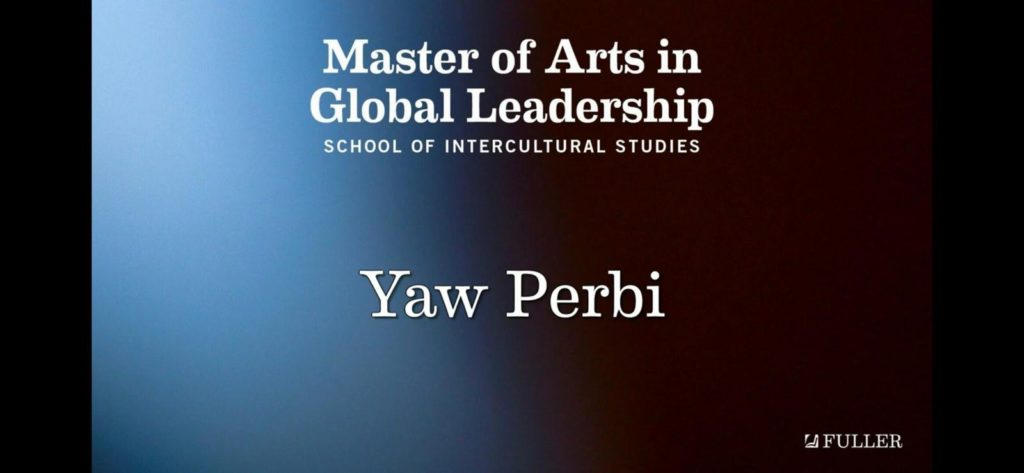
All I got was a screenshot; not walking across the stage as I had envisioned, let alone driving across the continent!
The point is not that God is some Supreme Heavenly Killjoy, eagerly looking out for whose parade He can rain on today or tomorrow but rather that we accept we are only human and humbly add ‘D.V.‘ to our plans, great or small, as long as they extend beyond this very second. Deo Volente. “Why, you do not even know what will happen tomorrow. What is your life? You are a mist that appears for a little while and then vanishes.” My days haven’t ended (yet) but my Commencement plans surely have.
Sorry, I’m not your Servant because I’m Black.
Dawid has a Black father and White mother (he doesn’t say in this video but I know the family well; a year ago I was in his parents’ home in the UK), and as you might already know just a speck, a drop, of Black in your genes makes you Black (don’t ask me why).
I can really relate to Dawid’s experience of it being assumed you’re a waiter or shop attendant or security officer, even at a building you may own, just because you’re Black. Incidentally, the first time I ever stepped in London was only in transit. Typically, as a frequent traveller I would be at the airport VIP lounge if there isn’t enough time to go gallivanting in the city or I have other work to do.
Being the only one of ?two Black persons at this Heathrow lounge a couple of years ago, a certain White couple wielding their empty plates around the buffet assumed I was a server and must’ve been totally embarrassed (or maybe they weren’t) when I politely smiled and said I had no idea how to help them with their request.
As a SERVANT-LEADER learning to humbly serve all humanity like Jesus my Master, the feet-washer, I’m willing to serve anyone, anywhere, at anytime (as I’m able) at my Master’s beckoning; BUT NOT BECAUSE I’M BLACK!
Anyway! Thank you my brother and friend, Dawid, for this video.
Again, for those who really want to learn and take action about the truth that #BlackLivesMatter, over to you. Be an ally to those of us with kinky hair with the kinks in the system, even if it was built that way!

